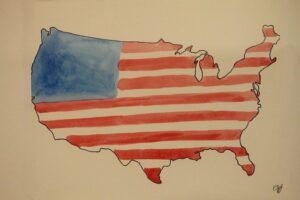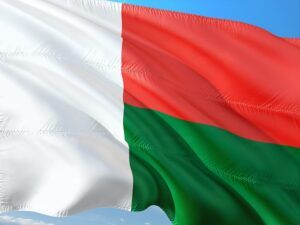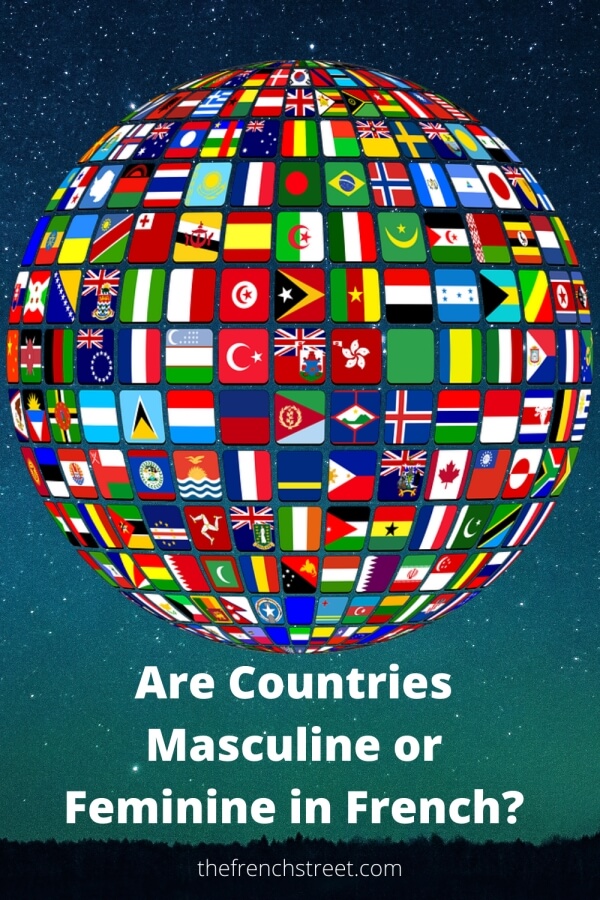Not too long ago, I wrote a post about the gender of nouns in French. Everything has a gender, so it’s important to understand the differences. This gets complicated for people whose native languages don’t have genders or where they are rarely used. That’s why many of them ask, “Are countries masculine or feminine in French?”
Countries are no exception to the rule. Each country is either masculine or feminine, and that will determine which modifiers (articles, adjectives, etc.) you will use.
But don’t fret just yet. Today we’ll show you some general guidelines to help you determine the gender of a country. We will also cover cities since there seems to be some confusion about them. C’est parti!
Feminine Countries

The easiest way to figure out the gender of a country is by its ending. As a general rule, the countries ending in -e are feminine.
Examples:
- la France
- la Belgique
- l’Espagne
- l’Argentine
- la Colombie
- la Russie
- la Chine
- l’Australie
There are six exceptions where the countries ending in -e are not feminine:
- le Mexique
- le Mozambique
- le Belize
- le Cambodge
- le Suriname
- le Zimbabwe
Other than that, the rest of the countries are masculine.
With feminine countries, we use the preposition en when talking about location.
Examples:
J’habite en France. I live in France.
Il est allé en Australie. He went to Australia.
When talking about origin, we only use the preposition de and drop the article.
Examples:
Je viens de la Belgique –> Je viens de Belgique. I come from Belgium.
Elle vient de l’Argentine –> Elle vient d’Argentine. She comes from Argentina.
Masculine Countries

Once you figure out feminine countries, masculine countries become a breeze.
With masculine countries, you have to remember two prepositions: au and du. Remember they’re the contractions of à le and de le, respectively.
For location, we use au. Examples:
On habite au Canada. We live in Canada.
Ils vont au Japon chaque année. They go to Japan every year.
For origin, we use du. Examples:
Vous venez du Royame-Uni. You come from the United Kingdom.
Elles viennent du Pérou. They come from Peru.
Plural Countries

Not only do countries have genders in French, but they also can be singular or plural. No matter the gender, we always use the article les with them when talking about general statements.
Examples:
- les États-Unis
- les Pays-Bas
- les Philippines
- les Seychelles
Just like singular countries, the preposition we use with plural countries will vary depending on whether we’re expressing location or origin. With plural countries, we use two prepositions: aux and des (short for à les and de les).
Examples:
J’habite aux États-Unis. I live in the U.S.
Il vient des Pays-Bas. He comes from the Netherlands.
Elle est allée aux Philippines. She went to the Philippines.
On habite aux Seychelles. We live in the Seychelles.
Countries with no Articles

Okay, so far we learned about the genders of countries and what to do if they’re plural. However, not all countries are preceded by articles. Such is the case of island countries and city-states.
Below is a list of countries with no articles:
- Madagascar
- Bahreïn
- Chipre
- Cuba
- Haïti
- Israël
- Malte
- Monaco
- Sainte-Lucie
- Saint-Marin
- Singapour
- Sri Lanka
What does all of this mean? Well, for starters, it doesn’t mean that these countries are neutral. They do have genders, although it’s trickier to figure them out.
When talking about location, we use the preposition à in most cases. In a few cases, we use the preposition en instead.
Examples:
J’habite à Madagascar. I live in Madagascar.
Il habite en Israël. He lives in Israel.
Expressing origin is not as complicated. In all cases, we always use the preposition de.
Examples:
Elle vient de Cuba. She comes from Cuba.
Ils viennent de Singapour. They come from Singapore.
Complicated, huh? I don’t blame you. For a comprehensive list of countries with their French translations, genders, and preceding articles (when applicable), I recommend you check out this link.
Nationalities
Nationalities also have genders in French. When talking about a woman’s nationality, all you have to do is add -e to the masculine form.
Examples:
américain –> américaine
canadien –> canadienne
français –> française
italien –> italienne
chinois –> chinoise
australien –> australienne
Note that when a nationality ends in -en, we double the n before adding -e.
Unlike English, nationalities are not capitalized in French.
Cities

Finally, let’s talk about cities. Are they masculine or feminine? Do we use articles with them? What about prepositions?
Unfortunately (or should I say, fortunately?), gender is not quite clear regarding cities. Not even l’Académie française, the maximum authority of the French language, is definitive in this regard. Even French people hesitate about this.
Take Paris as an example. How would you translate Paris is beautiful? Paris est beau or Paris est belle? Well, both are correct! Some would argue it’s masculine, but others would say it’s feminine because it refers to une ville (a city), which is a feminine noun. Confusing?
Having explained that, cities don’t have articles for the most part. We just say Paris, New York, Mexico (Mexico City), Beijing, Tokyo, Sydney, etc. However, there are a few exceptions. In some cases, an article is part of the city name, and we have to keep it. Examples:
- Le Havre
- Le Caire
- La Paz
- Les Andelys
- La Nouvelle Orléans
When talking about location, in most cases, we just use the preposition à. Examples: à Paris, à New York, à Sydney, etc. The only exceptions apply when talking about cities with articles. In this case, we say au Havre, au Caire, à la Nouvelle Orléans, etc.
To express origin, we use the preposition de. Examples: de Paris, de New York, de Sydney, etc.
Conclusion
As you can see, all countries have genders in French. Most of them have articles, although there are a few exceptions. As a general rule, those countries ending in -e are feminine, and the rest are masculine.
Keep in mind some countries, mostly islands and city-states, do not have articles. They do, however, have genders, but you will have to memorize them.
Cities are more complicated, especially when their names include articles. City genders are not quite clear, so it’s not a big deal as compared to countries.
Understanding the gender of countries in French is essential since that will tell you which prepositions and adjectives to use with them. That doesn’t mean it’s easy. There are a lot of exceptions. You will have to practice a lot, but it’s not impossible to master them.
What do you think? Do countries have genders in your native language? Is French too complicated in this regard? Let me know in the comments section below. Au revoir, les amis!

Let's Learn French! Are you ready to take your French to the next level? I'm glad you are! Whether you are a beginner or an intermediate/advanced learner, I can recommend a few options for you. For starters, if you're someone who likes to study on his own, I recommend the following programs: Busuu Mondly Rocket Languages However, if you would like to hire a teacher/tutor, I recommend you try the following: italki Lingoda Preply Feel free to check my site to learn about more resources. Don't forget to check back often to learn more about the French language and culture. Salut!


Je suis des Pays-Bas 🙂
French is just as hard as Spanish, I think. With this difference that I have been studying French from age 10 to 16 and now that I am studying Spanish I am 67. And although I don’t want to admit it, there is a difference!
I especially hate all the exceptions. Rules can be learned, but the exceptions drive me crazy. With as added difference: most French people speak at a normal speed, but the Spanish are like formula1 cars, always speaking in mach3. (OK, I know, this is mixing the carsport with aviation, LOL). How is that in Mexico? Are you speaking rapidly as well?
Anyway, you explain the differences very well and it was an interesting read, so thanks, Enrique!
Hi, Hannie,
I may be biased here since I’m a native Spanish speaker, but I think most of those who speak a Romance language agree French and Romanian are the hardest ones to learn. Speed is something relative because, for us, it may be normal to speak at a certain speed, while for others, it may seem too fast.
I do agree with you regarding rules. French has a lot of exceptions that we need to memorize. They may not make any sense in our native languages, but that’s exactly the bauty of learning foreign languages.
Thanks for commenting.
I so much love the French language, especially the fact that there is the musculine and feminine factor. In my opinion, I think this is what makes the French language very unique. I do not know how to speak French fluently, but getting to read about how the musculine or feminine rule affects countries in French is an added knowledge for me. Thanks for this educative piece of information.
Hey, Nelson,
Yes, the French language is a little bit complicated in this regard, but as you mentioned, that’s the beauty of languages.
Feel free to check out my other posts to learn more about the French language and culture.
Thanks for commenting.